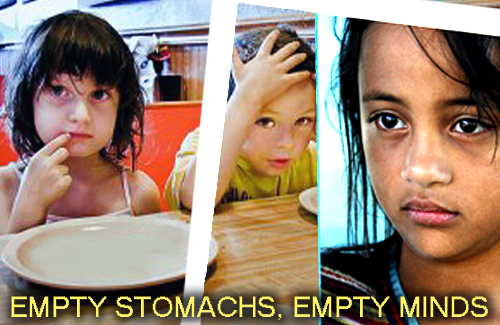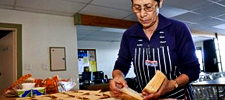
WHERE DID WE GO WRONG?
We ask the question: “What’s happening to our country today and how has it come to this that our own children living in a society like New Zealand – which is relatively affluent and which produces so much food, that we should have so many of them going to school without breakfast or lunch. Is it acceptable that we raise a generati
on of hungry and malnourished children who will transition into adulthood intellectually impaired?
Hungry and impaired children are the squandered gifts of humanity. Most never attain their potential physically, emotionally and mentally. So before you go to sleep tonight imagine what it’s like to be one of them. Then, imagine what it would also be like if all that changed starting with one child.
|
Watch The Video |
Squandered Gifts of Humanity Children do not choose their circum stances and they are the people least able to change those circumstances. Children do not choose to live in poverty or in a fa mily that struggles to cope. If we believe as a country that every child has the right to thrive, belong and achieve, we need to accept that support for these children and young people, and for their families, is a priority, as well as a cost effective social and economic investment in New Zealand’s future. |
THEY ARE THE FORCE FOR LIFE
Hungry children have little capacity to learn and fill up their minds. Lack of nutritious food on a regular basis delays brain development and ability to learn. When children do not get enough to eat, their bodies try to save the meagre amounts they get simply to keep basic body functions going. The effects of poor nutrition do not occur alone as these children also suffer from poor housing, healthcare issues, unemployed parents and weakened family and community support systems. Nutrition is just one of the many factors that need yet to be addressed.
All children, regardless of their station in life, are more powerful, more precious than any other natural resource we can have. They are a force for life and represent our future. If we give them a chance, their generation may surprise us. If we are to have faith that mankind will survive and thrive on earth, we must believe each succeeding generation will be wiser than its progenitors. We transmit to them the sum of our knowledge and ways. Their responsibility is to use, add and transmit it to their children.
Clearly, a healthy and educated population creates skilled workforces who end up being taxpayers who are essential to the success of government, local authorities and business. But feeding our society’s hungry children shouldn’t be left to well-meaning companies and charities.
HANG OUR HEADS IN SHAME
 Hunger across the land can no longer be hidden. Here in Hamilton City, food vans operated by a Catholic charity are now feed ing about 800 people a week across five Hamilton suburbs, and smaller numbers in Tauranga and Rotorua.
Hunger across the land can no longer be hidden. Here in Hamilton City, food vans operated by a Catholic charity are now feed ing about 800 people a week across five Hamilton suburbs, and smaller numbers in Tauranga and Rotorua.
The vans have become easily recognisable as these turn street corners on their daily runs and come to a stop kids come flocking to them. Then, after a while, you’d see their own parents coming out as well. A spokesman of the charity estimates that while 78% of the food go to children – mostly from families on welfare, he’s also observed a growing number of working families queuing up for food. A lot of it is having their hours reduced, so instead of the husband working 50- or 60-hours a week he’s back down to 40, and they can’t survive.
Catholic Bishop of Hamilton Denis Browne said all Catholic bishops are concerned about the problem. Food is donated by local supermarkets and by Catholic parishioners who have been asked since the recession began to bring one item of food to church each Sunday for hungry families. “We should all hang our heads in shame to think that it’s our children who are hungry in this land of plenty,” Bishop Browne said.
EVER SO CLEARLY EVIDENT
 Hunger in the streets is becoming ever so clearly evident elsewhere in the country. The Salvation Army has also seen a 22% jump in food parcels handed out in cities like Auckland, Whangarei and in Northland in the past year, which is put down to rising rents for families who are already on the maximum accommodation subsidy.
Hunger in the streets is becoming ever so clearly evident elsewhere in the country. The Salvation Army has also seen a 22% jump in food parcels handed out in cities like Auckland, Whangarei and in Northland in the past year, which is put down to rising rents for families who are already on the maximum accommodation subsidy.
It would not come as a surprise that other charities across New Zealand are stepping up programmes aimed at feeding children attending schools in suburbs because of need. But reliance on charity and their volunteers is often uncertain, especially in difficult economic times unless government, local authorities and businesses all come together with them for good reason to combat what is turning out to be a growing problem one can’t ignore.
One such charity for example – The SCOT Trust New Zealand, is now doubling up its efforts to line up sponsors as partners to stand behind this effort. The Trust has come up with a page on their website which explains in a good-for-business like manner how and why sponsorship engagements can produce measurable returns and a fit with their organisation’s culture and values that are authentic, and ones that promote and differentiate a public profile and reputation which demonstrates how involvement impacts and transforms lives of disadvantaged children and the families and commu nities where they come from.
What is also known today is that child poverty in New Zealand has doubled over the last 30 years. Using official household income statistics, it is estimated that 270,000 (25%) children live in poverty, a comparison that ranks New Zealand very poorly alongside other OECD and developed nations.
THE IMPORTANCE OF CHARITIES
The stew in the pot is just beginning to boil up.
A new parliamentary Bill was introduced in November 2012 seeking to amend the Education Act of 1989. It provides for the introduction of fully State funded breakfast and lunch programmes into all decile 1 and 2 schools and other designated schools in New Zealand. The meals will be available to all enrolled students in these schools free of charge, and will be required to meet Ministry of Health nutritional guidelines.
The aim of this Bill is to feed children so that their wellbeing and learning at school is improved and it schools the flexibility to implement practices that work best for them.
 Called the ‘Feed the Kids’ Bill, it also re cognises the importance of charities, busi nesses, and school volunteers currently in volved in food in schools programmes be cause they will be important to the success of this policy if and when it comes into law.
Called the ‘Feed the Kids’ Bill, it also re cognises the importance of charities, busi nesses, and school volunteers currently in volved in food in schools programmes be cause they will be important to the success of this policy if and when it comes into law.
However, because another Local Bill has been added to the list and because other Member’s Bills have been set down for second reading, the ‘Feed the Kids’ Bill has been moved further down the list. Because of these changes, it will instead go before Parliament in early June this year to be considered instead by a Select Committee.
As of this writing, Labour, the Mana Movement, Greens, the Maori Party, NZ First and independent MP Brendan Horan are all supporting the Bill but a spokesman for United Future MP Peter Dunne – who holds the balance of power on the issue says that Mr. Dunne opposes the bill. “It is far too simplistic to be an adequate solution to what is a real problem,” he says.
You might agree that the reasons why poverty exists may be complex. But then again, what’s so complex about feeding our society’s hungry children? It’s very simple really – empty stomachs, empty minds.
AN UNDENIABLE FACT REMAINS
 While some research shows that the main causes of poverty lie elsewhere – the lack of jobs, low income, inadequate, over crowded and high-cost housing, poorly targeted welfare, racism in the labour mar ket, lack of education, poor health and ins titutional racism in the judicial system to name just a few, an undeniable fact remains that other developed countries facing the same issues of poverty and child hunger have proactively done some thing about it ahead of New Zealand.
While some research shows that the main causes of poverty lie elsewhere – the lack of jobs, low income, inadequate, over crowded and high-cost housing, poorly targeted welfare, racism in the labour mar ket, lack of education, poor health and ins titutional racism in the judicial system to name just a few, an undeniable fact remains that other developed countries facing the same issues of poverty and child hunger have proactively done some thing about it ahead of New Zealand.
For example, Finland and Sweden provide state-funded free school meals. Other countries like the UK and Scotland provide state-funded free meals to eligible students, and some such as Brazil and Chile provide state-funded free meals to schools with high levels of deprivation.
New Zealand may still have some positives sides it can boast of but the negatives are growing on an almost daily basis. For one, if you look into the future we don’t see much there for our kids at the rate we are going.
The economic benefits of investing in children have been extensively docu mented. Investing fully in our children today will ensure the well-being and productivity of future generations of Kiwis for decades to come. By contrast, the physical, emotional and intellectual impairment that poverty inflicts on hungry children across our land can mean a lifetime of suffering and want – and a legacy of poverty for the next generation which follows.
All of us, including government, have a role to play in tackling this issue. The Filipinos in New Zealand Group, which sponsors community websites in Hamil ton, Auckland, Wellington and Christchurch, is calling on New Zealanders of every stripe to let our government know just how important it is to ‘feed the kids’.
Visit ‘How You Can Play A Role’ Contact List page here.

 During the Spanish
During the Spanish






























how do we get to belong to a Filipino group in Hamilton please
we want to know other Filipinos in Hamilton and especially new mothers